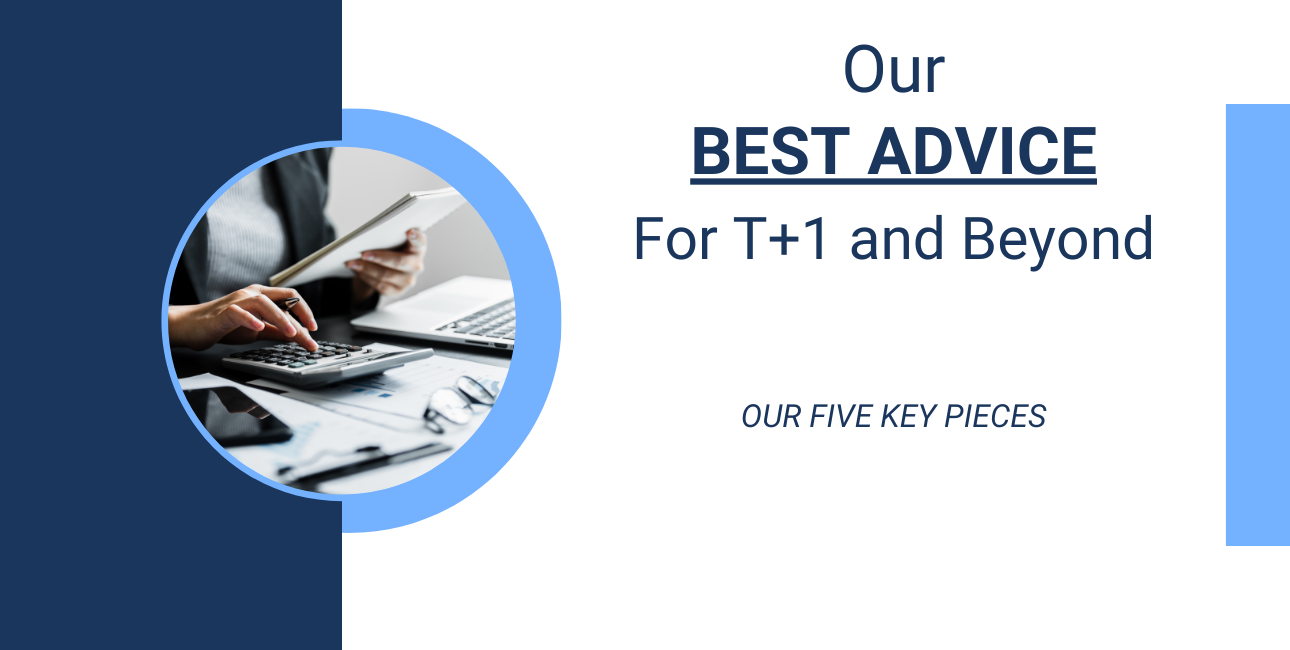
Our Best Advice for T+1 and Beyond
Settlement cycles have been shortening for years, but the
changes required for T+1 have increased the speed to another level.
The United States transitioned to T+1 settlement for
transactions in US equities, corporate debt, and unit investment trusts as of
May 28, 2024, per Rule
15c6-1. The goal of shortening the settlement cycles creates more efficient
markets through reduced settlement risk and liquidity requirements.
What is T+1?
T+1 settlement refers to a securities transaction
settlement system where the transfer of securities and funds occurs one
business day after the trade date. The process is the completion of a trade,
where the buyer pays for the securities and the seller delivers them. The
notation “T+1” stans for the trade date plus one business day.
How T+1 Settlement Impacts Operations
The T+1 settlement requirement may impact operations in
the following ways:
Processing Timeframe
Additional support for the shortened window require
releases shares to participants once vesting criteria are met will need to be
reviewed and approved. Companies need to assess their standard fair market
value (FMV) to support this shorter timeframe.
Tax Calculations
Calculations need to be completed quicker for timely
delivery to the broker.
Payroll
Payroll coordination between brokerage data feeds,
detailed information, and communication must support the reduced time
requirements.
Approvals
Share delivery approvals need to be delivered quicker.
Vendor partnerships
All associated vendors must coordinate to move quickly for
timely processing.
Our Best T+1 Advice
Coordinating compensation is a critical aspect of
managing talent and ensuring fairness and competitiveness in the job market. Strategic
alignment must be in place in shaping and implementing the organization’s
approach to compensation and benefits, with a focus on attracting and retaining
top talent, driving performance, and ensuring overall employee satisfaction and
engagement.
Our five key pieces of advice include:
1.
Look at the holistic picture
The comprehensive and
interconnected view of the stock plan administration requires all relevant
factors and their interrelationships. The management and oversight of the
company’s stock-based compensation program must go beyond analysis of the
isolated parts with an emphasis on the relationships and connections between
the different elements to enhance the implementation, communication, and
ongoing maintenance of equity programs.
2.
Identify gaps in the process
Specific gaps may vary based on
the context and company. To identify gaps in the process, conduct a thorough
analysis, gather feedback from stakeholders, and use performance metrics in the
assessment. Common gaps may include lack of clear communication, outdated
information used, bottlenecks int eh workflow, lack of quality control, or
inadequate identification and mitigation of potential risks in the process.
3.
Foster relationships with partners
Set up recurring calls with
anyone involved in the process, including your administrative outsource
provider, total rewards, treasury, payroll, legal, etc. Establishing a
continuous feedback loop to learn from the outcomes of decisions and analysis
will help refine a future approach.
4.
Get prepared for what’s next
T+1 is not the beginning, nor
will it be the end. As technology advances, outdated tools and processes will
not support equity programs. Awards have come a long way, but will continue to
evolve at a rapid pace. As the market looks towards instantaneous transactions,
reduced credit risk, and increased liquidity, we will soon be moving towards
even faster processing.
5.
Leverage your Outsourcing Partner
Companies that outsource equity
administration may be ahead of the curve. Utilizing a third-provider to focus
on non-core functions helps focus on strategic activities, enhancing overall
efficiency and have readily available guidance on navigating the complex
future.
At Stock &
Option Solutions, our team helps with interim placement, long-term consultants,
and full outsourcing to help you navigate from short-term needs to long-term,
sustainable department.
Contact us
for your no-obligation consultation to see if outsourcing is right for you.
Follow us:

